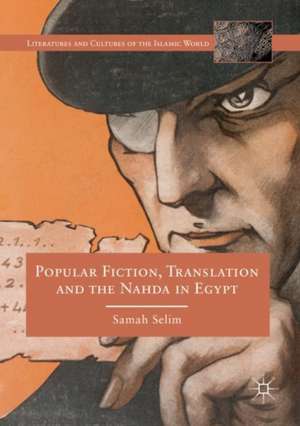Popular Fiction, Translation and the Nahda in Egypt: Literatures and Cultures of the Islamic World
Autor Samah Selimen Limba Engleză Paperback – 14 aug 2020
| Toate formatele și edițiile | Preț | Express |
|---|---|---|
| Paperback (1) | 383.12 lei 6-8 săpt. | |
| Springer International Publishing – 14 aug 2020 | 383.12 lei 6-8 săpt. | |
| Hardback (1) | 500.26 lei 6-8 săpt. | |
| Springer International Publishing – 10 iul 2019 | 500.26 lei 6-8 săpt. |
Din seria Literatures and Cultures of the Islamic World
-
 Preț: 394.51 lei
Preț: 394.51 lei -
 Preț: 388.72 lei
Preț: 388.72 lei -
 Preț: 387.75 lei
Preț: 387.75 lei - 15%
 Preț: 641.71 lei
Preț: 641.71 lei -
 Preț: 388.72 lei
Preț: 388.72 lei - 15%
 Preț: 641.20 lei
Preț: 641.20 lei - 15%
 Preț: 640.06 lei
Preț: 640.06 lei -
 Preț: 389.70 lei
Preț: 389.70 lei -
 Preț: 387.75 lei
Preț: 387.75 lei -
 Preț: 387.75 lei
Preț: 387.75 lei -
 Preț: 390.63 lei
Preț: 390.63 lei -
 Preț: 422.90 lei
Preț: 422.90 lei -
 Preț: 381.21 lei
Preț: 381.21 lei - 15%
 Preț: 588.50 lei
Preț: 588.50 lei - 15%
 Preț: 639.25 lei
Preț: 639.25 lei -
 Preț: 320.40 lei
Preț: 320.40 lei - 15%
 Preț: 638.24 lei
Preț: 638.24 lei - 9%
 Preț: 677.46 lei
Preț: 677.46 lei -
 Preț: 386.81 lei
Preț: 386.81 lei
Preț: 383.12 lei
Nou
Puncte Express: 575
Preț estimativ în valută:
73.31€ • 76.75$ • 60.66£
73.31€ • 76.75$ • 60.66£
Carte tipărită la comandă
Livrare economică 07-21 aprilie
Preluare comenzi: 021 569.72.76
Specificații
ISBN-13: 9783030203641
ISBN-10: 3030203646
Pagini: 232
Ilustrații: XI, 232 p.
Dimensiuni: 148 x 210 mm
Greutate: 0.3 kg
Ediția:1st ed. 2019
Editura: Springer International Publishing
Colecția Palgrave Macmillan
Seria Literatures and Cultures of the Islamic World
Locul publicării:Cham, Switzerland
ISBN-10: 3030203646
Pagini: 232
Ilustrații: XI, 232 p.
Dimensiuni: 148 x 210 mm
Greutate: 0.3 kg
Ediția:1st ed. 2019
Editura: Springer International Publishing
Colecția Palgrave Macmillan
Seria Literatures and Cultures of the Islamic World
Locul publicării:Cham, Switzerland
Cuprins
Chapter 1: Introduction.- Chapter 2: Bad Books for Bad Readers.- Chapter 3: The People's Entertainments.- Chapter 4: The Things of the Time: Cairo at the Turn of the Century.- Chapter 5: New Women and Novel Characters.- Chapter 6: Fiction and Colonial Identities.- Chapter 7: Pharaoh's Revenge.- Chapter 8: The Mysteries of Cairo.
Notă biografică
Samah Selim is Associate Professor in the Department of African, Middle Eastern, and South Asian Languages and Literatures at Rutgers University, USA. She is the author of The Novel and the Rural Imaginary in Egypt, 1880-1985 (2004).
Textul de pe ultima copertă
This book is a critical study of the translation and adaptation of popular fiction into Arabic at the turn of the twentieth century. It examines the ways in which the Egyptian nahda discourse with its emphasis on identity, authenticity and renaissance suppressed various forms of cultural and literary creation emerging from the encounter with European genres as well as indigenous popular literary forms and languages. The book explores the multiple and fluid translation practices of this period as a form of ‘unauthorized’ translation that was not invested in upholding nationalist binaries of originality and imitation. Instead, translators experimented with radical and complex forms of adaptation that turned these binaries upside down. Through a series of close readings of novels published in the periodical The People’s Entertainments, the book explores the nineteenth century literary, intellectual, juridical and economic histories that are constituted through translation, and outlines a comparative method of reading that pays particular attention to the circulation of genre across national borders.
Caracteristici
Examines several interrelated fields including literary history, translation theory, urban studies, and cultural studies Reframes a series of major questions in translation studies and comparative literature including the “ethics” of translation in colonial and postcolonial contexts Taps into an overlooked and rather rich archive of early twentieth-century fiction and periodicals
